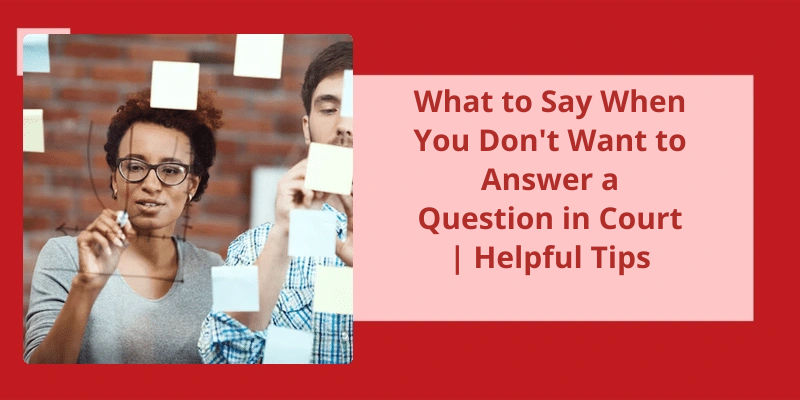When appearing in court, there may be circumstances where a witness is asked a question that they don’t want to answer. This could be due to a variety of reasons, including self-incrimination or the protection of confidential information. However, it’s important for witnesses to understand that they can’t simply refuse to answer a question without consequences. Knowing how to effectively respond in such situations is critical to avoiding potential legal ramifications. In this article, we will explore several approaches that witnesses can take when they don't want to answer a question in court, from asserting their Fifth Amendment rights to requesting that the question be rephrased.
How Do You Decline a Court Question?
Declining a court question can be a tricky situation, as it involves walking a fine line between being respectful to the court and avoiding incriminating oneself. It’s imperative to understand that just because a question is asked by a judge or attorney, it doesn’t mean that one is legally obligated to answer it.
This could be because of attorney-client privilege or invoking the fifth amendment right against self-incrimination. However, it’s essential to have a valid reason that’s legally supported by the court, or one could be held in contempt of court.
It’s also possible to refuse to answer certain questions by explaining why an honest answer can’t be provided without divulging privileged information. For example, an attorney could decline to answer a question by stating that providing an answer would violate an ethical rule or a duty of confidentiality owed to a client.
Sometimes, offering an alternative method of obtaining information can be useful. For instance, if a question is asking for an opinion, one could offer facts that would lead the court to draw it’s conclusion. This method not only satisfies the courts request but also offers more information and insight.
Judges and attorneys are used to hearing evasive answers, and it’s unlikely that one can outsmart them. It’s best to be honest and direct, emphasizing that providing an incomplete answer would be more misleading than an honest answer that requires more information.
Navigating a courtroom can be intimidating, especially for those who’ve never been through the experience before. One of the most nerve-wracking moments can be answering a judge’s questions. But what happens if you don’t want to answer? Is it mandatory for you to do so? Let’s explore this further.
Do You Have to Answer a Judges Questions?
It’s important to understand that when you’re in a courtroom, you’re expected to answer any questions that the judge asks you. This is part of the legal process and is essential to ensuring that justice is served. If you refuse to answer a question, it could lead to negative consequences such as being held in contempt of court.
However, there are situations where you may not want to answer a question. It’s important to understand that you do have certain rights in these situations. If a question is improper or violates your rights, the district attorney can object and the judge will typically side with them. It’s important to keep this in mind when deciding whether or not to answer a question.
If you do decide not to answer a question, it’s important to do so respectfully. Refusing to answer a question in a rude or disrespectful manner can be seen as a sign of disrespect for the court and could lead to consequences. It’s important to remain calm and composed at all times, even if you feel frustrated or overwhelmed.
One important thing to keep in mind is that you should never look to the district attorney or judge for help in answering a question. You’re on your own in the courtroom, and it’s up to you to provide your own answers. This can be stressful, but it’s important to remember that you do have the right to remain silent if you choose to do so.
Finally, if you’re unsure about whether or not you should answer a question, it’s always best to consult with your attorney. Your attorney can provide valuable guidance and advice on how to handle difficult questions and situations in the courtroom. With the right preparation and guidance, you can navigate the legal system with confidence and ensure that your rights are protected at all times.
It’s important to understand your rights and obligations when testifying in court. As a sworn witness, refusing to answer a question without a valid objection can lead to consequences including being held in contempt of court. However, there are circumstances where it’s appropriate to decline to answer a question. Let’s explore these further.
Can You Refuse to Answer a Question on the Stand?
Being called to the stand as a witness is a serious responsibility, as it involves testifying under oath about what you know regarding a particular case. In most cases, when a witness is called upon to testify, their testimony can either make or break a case. However, answering some questions may be difficult and uncomfortable, but as a witness, there are rules you need to abide by.
One of the most common concerns for a witness is whether they can refuse to answer a question that’s posed to them. As a result, if the witness declines to answer, it may lead to dire consequences. The law requires that a witness answer all questions truthfully and to the best of their knowledge.
Despite this, there are some instances where a witness may have a valid legal justification for withholding an answer.
In other cases, witnesses may have concerns about their safety or privacy. For example, if answering a question may reveal sensitive information about their home address or location, the witness may appeal to the court to be excused from answering the question. Ultimately, the decision to excuse the witness is at the discretion of the judge.
In some cases, witnesses may be unable to answer a question due to a lack of understanding of a particular term or concept. In such a situation, the witness may ask the judge or the attorney to rephrase or clarify the question to clarify their understanding.
When such a situation arises, the witness should consult the judge or attorney to understand their options better. It’s important for witnesses to stay truthful, as truthful testimony can ultimately make a significant difference in the outcome of a case.
Source: Can a witness refuse to answer a question in a court if he …
It’s natural to feel uneasy or defensive when faced with a question that you’re not comfortable answering. While it may be tempting to lie or evade the truth altogether, there are some phrases you can use to deflect the question without resorting to dishonesty. Here are ten English phrases that you can use to politely avoid answering a question.
What Do You Say to Avoid Answering Questions?
As human beings, we often find ourselves in situations where we don’t want to answer a question. For whatever reason, we may choose to avoid giving a direct answer. This could be because we don’t have the information required, we don’t wish to disclose certain information, or simply because we don’t feel like answering. When faced with such situations, we sometimes need to think on our feet and come up with responses that can help us avoid direct answers.
One of the classic responses that many of us use is the phrase “no comment.”. This phrase is often employed by politicians, celebrities, or public figures who don’t wish to comment on a particular subject. While it can be neutral in some cases, it can also be perceived as evasive or secretive.
Another phrase that’s commonly used to avoid answering a question is “Im not at liberty to say.”. This phrase implies that there are certain restrictions that prevent you from sharing the information that’s being asked for. It can be a useful response when you’re legally bound, or when you aren’t at liberty to share confidential or proprietary information.
Sometimes, we’re simply not sure of the answer to a question or require more time to think about it. In such situations, “wait and see” could be a suitable response. It indicates that you havent made up your mind yet and need some time to come up with a response.
Another phrase that can help avoid direct answers is “let me get back to you.”. This implies that you’ve heard the question and need to research or gather more information before coming up with a response. It’s a professional way of avoiding knee-jerk reactions and ensuring that you provide an accurate response.
When faced with a request for information that you consider confidential, it’s appropriate to state so. “Im sorry, thats confidential” is an effective response that conveys the need to keep certain information private. It can be used when dealing with friends, colleagues, or acquaintances who aren’t authorized to access confidential information.
Finally, it’s acceptable to say that something is personal when you’re asked a direct question about a private matter. “Sorry, thats personal” conveys that the matter is sensitive and shouldn’t be discussed openly. This phrase can be applied when dealing with friends or family members who may inadvertently ask personal questions.
When faced with a question that could potentially incriminate you in a court of law, there are legal options available to you. The Fifth Amendment of the Constitution provides individuals with the right to avoid giving any evidence that could implicate themselves. One way to exercise this right is by pleading the Fifth Amendment, which gives them the legal right to refuse to answer any question that may incriminate themselves. In the following sections, we’ll explore some of the ways to refuse to answer questions in court without putting yourself in jeopardy.
How Do You Refuse to Answer a Question in Court?
However, exercising this right can be a delicate matter, as it requires caution and strategy. When a question is asked in court and you don’t want to answer it, you can politely say “I plead the Fifth Amendment” or “I invoke my right against self-incrimination.”. This will send a clear message to the court and the opposing counsel that you’re declining to answer the question on constitutional grounds.
It’s important to note that the Fifth Amendment applies not only to criminal cases but also to civil proceedings, administrative hearings, and other legal contexts where your words could potentially be used against you. If you’re concerned about the possibility of self-incrimination, it’s always safer to invoke the Fifth Amendment than to take a risk and potentially reveal damaging information.
However, it’s also important to remember that the Fifth Amendment isn’t an absolute shield that can protect you from all consequences of your speech. In some situations, such as when you’ve already made incriminating statements or when your refusal to answer a question could itself be incriminating, the court may use your silence or your choice to invoke the Fifth Amendment as evidence against you.
Therefore, it’s advisable to seek legal counsel before making a decision to plead the Fifth Amendment or not. A skilled attorney can help you assess the risks and benefits of each option and devise a strategic approach to protect your rights and your case. By working with an experienced lawyer, you can ensure that you’re navigating the legal system in a responsible and effective manner.
Examples of Situations Where Invoking the Fifth Amendment Would Be Appropriate
- During a police investigation when questioned about a potential crime
- During a legal trial when the defendant’s testimony may incriminate themselves
- When testifying in front of a grand jury when questions could lead to self-incrimination
- During a Congressional hearing when questioned about illegal activity
- When facing a potential lawsuit where your testimony could be used against you
Conclusion
In conclusion, when faced with a question in court that you don’t wish to answer, it’s important to approach the situation with caution and tact. Resorting to outright lies or evasion isn’t a viable solution and can have serious legal consequences. Instead, consider politely declining to answer the question and providing a valid reason for doing so. Additionally, it may be helpful to consult with a legal professional beforehand to ensure that you’re well-informed about your rights and the potential consequences of your actions. Ultimately, the key is to remain calm, composed, and honest, while also protecting your own interests and rights within the legal system.






